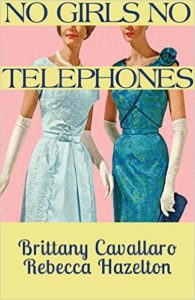No Girls No Telephones
 Brittany Cavallaro and Rebecca Hazelton,
Brittany Cavallaro and Rebecca Hazelton,
Black Lawrence Press, 2014,
28 pages, paper, $8.95,
ISBN: 978-1-62557-999-7
Buy this Book
Probably the finest essay on poetry I’ve read this year is Matthew Buckley Smith’s “Why Poems Don’t Make Sense,” which can be found here in 32 poems. In it, he explains what sense is, how it differs from logic, and what nonsense entails, while illuminating the concept of theory of mind in relation to poetry. It’s a smart, accessible, and important piece.
I start there because at the time I first read Smith’s essay, I was also in the midst of reading No Girls No Telephones by Brittany Cavallaro and Rebecca Hazelton. A collaborative chapbook of paired poems that take their shared titles from lines of Berryman, NGNT comes with an author’s note at the end that I’ll reproduce here in part, as it’s necessary for understanding how I’m coming at this review:
Authors’ Note:
Brittany had the idea of writing an opposite imitation of a
John Berryman Dream Song, and suggested that Rebecca write
an opposite of that opposite. It was a strange game of literary
translation.
Simone Muench blurbs on the cover that the poems operate as a game of telephone to filter the sense of poems by John Berryman through Cavallaro and Hazelton. The authors’ note explains the process whereby noise was added to the system, so to speak, with opposites of opposites reflecting off one another to introduce distortion. As you might expect, just like in a game of telephone, the message at times becomes garbled well beyond lyricism, crossing into true nonsense. I tried all the usual ways of maximizing the poems’ content: reading aloud to myself, reading to someone else, reading out of order. Nothing worked. And yes, there’s a natural pleasure born of unexpected and unexpectable constructions, but I kept thinking about Smith’s essay and my native distaste for nonsense.
So, brief aside, what’s wrong with nonsense? To me, it smacks of a writer who, though having nothing to say, nevertheless seeks an audience. And was that what was happening in NGNT? No, but I was having a hard time figuring out what was happening. While I’m only marginally familiar with Cavallaro, Hazelton’s poems are not merely sensible but frequently profound. The meaning had to be in there somewhere. Berryman may be ethereal or even transcendental but he isn’t nonsensical, and the best games of telephone retain echoes of the intended message despite the accidents of flawed transmission.
Then, once I saw it, how had I not seen it? There aren’t just structural parallels between the paired poems; they are like transparencies to be laid one over the other. I suspect my initial blindness to this came from holding too tightly to the game of telephone concept. I kept trying to understand it through that lens, however figurative, despite my deepening frustration. While I can certainly see how it was relevant to the composition of the book, it put me on false footing to assume this would be the most fruitful way to read the poems.
This misstep was admittedly my own fault. That the method of composition does not imply the method of interpretation may be self-evident to others, but this was a learning moment for me. Anyway, what was genuinely captivating about the book was how two strophes of nonsense, on opposing pages, would give rise to something sensible if non-concrete, “sense without reference,” when considered simultaneously, and that this sensibility resonated as authentically Berrymanesque. It’s not the intuitive way to read poems, and it’s not exactly easy, but it taught me something. Not in the way of aphorism or analogy, or any of the pleasant methods through which I expect to encounter a lesson in most poems, but by frustrating my understanding and then composing sense in a manner I had never before experienced.
The last thing I want to get into is how Cavallaro and Hazelton play with opposites throughout NGNT. I’m fascinated by opposites, not so much in the antonymic dark / light, land / sea kinds of couplings, but when we think, for example, of the opposite of a park. The first thing that comes to my mind is wasteland, but what about office the opposite of park? This way of thinking can work as a lever for the imagination. For instance, what if the opposite of plant is not animal, but something that thrives on moonlight and vodka? The opening lines of the poems “Mission Accomplished” demonstrate this effect to highlight a mode of seeing and thinking that is acutely poetic:
Her inner life was left on a marked tree
And its opposite:
Our outer hearts are found in an unmarked grave
That’s just for the flavor of what’s happening. Overall, my experience of reading NGNT was non-recreational but rewarding. I don’t know that it’s exactly avant-garde, but for me it expanded the possibilities of nonsense in ways far more sophisticated than the attempts made in the vast bulk of conceptual poetry I’ve come across. And it has me thinking I perhaps ought to mail my copy to Mr. Smith.
— Andrew Purcell

